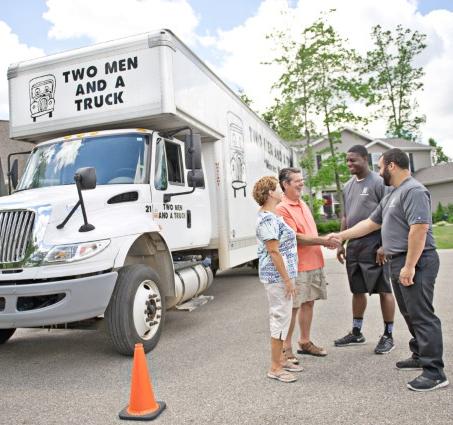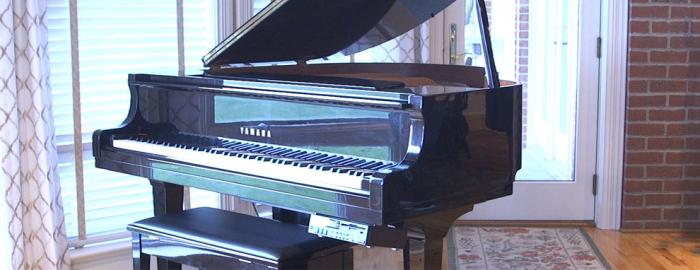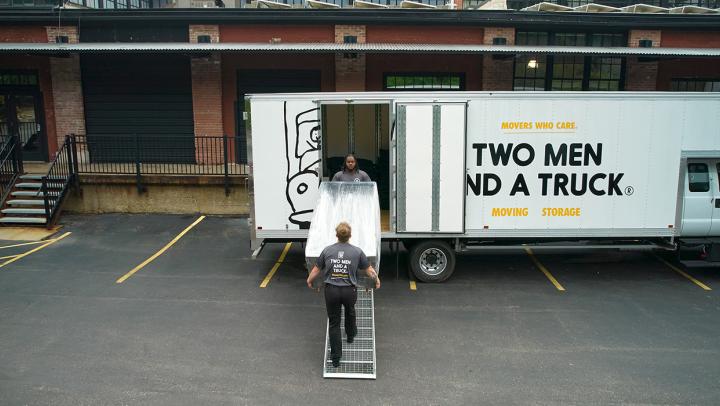Moving a piano is no ordinary task - just like coordinating a symphony, every note must be played with precision and care. At TWO MEN AND A TRUCKⓇ, we've mastered the art of piano moving, transforming what might seem like a daunting task into a harmonious endeavor. In this comprehensive guide, we'll unveil the intricate steps of our process, guiding you through each movement with finesse and expertise. Prepare to witness the magic unfold as we ensure your beloved instrument reaches its new destination unscathed and ready to serenade once more.
What You Need
-
Tape measurer
A tape measurer is needed for accurately measuring doorways, hallways, and other spaces along the pathway where your piano will be moved.
-
Piano disassembly tools
Tools like screwdrivers and wrenches will be needed to disassemble delicate parts of the piano, such as legs, pedals, and other removable parts. They ensure that each piece is carefully removed without causing any damage to the instrument.
-
Moving blankets and stretch wrap
Moving blankets provide cushioning to prevent scratches and dents, while stretch wrap securely wraps around the piano to keep the blankets in place and provide additional protection.
-
4-Wheel dolly
A dolly provides stability and support while moving the piano, allowing easier navigation across surfaces such as hardwood floors, carpets, or ramps. We recommend the 4-wheel dolly because it is better suited to moving a piano than a 2-wheel dolly.
-
Lifting straps
Lifting straps are designed to distribute the piano's weight evenly, reducing strain on the movers' backs and allowing for safer lifting and carrying.
-
Piano board
The piano board is a specialized platform that provides a flat, stable surface for the piano to rest on during transport, further reducing the risk of damage. It is especially needed for moving larger pianos, such as baby grand pianos.
-
Ratchet straps
Ratchet straps are needed to secure the piano to the dolly and to the walls of the moving truck, preventing it from shifting or tipping over during transit.
-
Ramps
Ramps provide a smooth incline for loading the piano onto the moving truck, ensuring a steady and controlled ascent. This helps minimize strain on the instrument and the person moving it.
Step-by-Step Instructions
-
1Step 1Measure the piano and pathways
Use a tape measurer to measure your piano and the doorways, hallways, and other spaces along the pathway where it will be moved. This step is important to ensure that there is enough clearance for the piano to pass through without any obstacles or tight squeezes. This prevents potential damage to both the piano and its surroundings.
-
2Step 2Disassemble the piano
With utmost precision and care, disassemble all removable parts of the piano, such as the music rack, lid prop, and piano lid. Safely store all screws and small components to avoid misplacement.
-
3Step 3Wrap the piano
After disassembly, wrap your piano and its components in moving blankets, securing them snugly with stretch wrap. This protective layering safeguards your instrument from any potential scratches or damage during the move.
-
4Step 4Lift the piano
Use lifting straps to lift your piano onto the 4-wheel dolly carefully. This step requires at least two people to ensure safety and stability throughout the lifting process. We strongly advise against attempting to move a piano all by yourself.
-
5Step 5Secure the piano on the dolly
Once the piano is positioned on the dolly, secure it with ratchet straps to prevent shifting or slipping during the moving process.
-
6Step 6Move the piano out of the house
Slowly and carefully move the piano out of the house. Make sure to navigate through doorways and hallways cautiously to avoid damaging the piano or the walls. Take your time and exercise patience during this important step.
-
7Step 7Load the piano onto the truck
Using a ramp, guide the dolly, with your piano aboard, onto the moving truck. Position the piano towards the front of the truck to minimize any potential movement during transit.
-
8Step 8Secure the piano in the truck
Once inside the truck, use ratchet straps and additional moving blankets to secure your piano firmly. This extra layer of security ensures a safe and stable journey to your new destination.
-
9Step 9Reassemble your piano
Upon arrival at your new home, carefully unwrap your piano, ensuring all components are intact and undamaged. Reassemble your instrument with precision and care, ready to fill your new space with beautiful melodies once again.
Moving a piano requires strength and precision. If you're unsure about any step, consider reaching out to the professionals at your local TWO MEN AND A TRUCK franchise. We are the MOVERS WHO CAREⓇ, and we’re here to help make your move as smooth and stress-free as possible.

Thinking of Moving Yourself?
Think Again!
While moving yourself may seem less expensive... the costs add up.
Do-It-Yourself Moving Costs:
- Truck Rental
- Mileage
- Fuel Charge
- Additional Insurance
- Equipment Rental
(straps, rope, furniture pads, bungee cords, stretch wrap, dollies, etc.)
- Time
- Boxes & Packing Supplies
- Possible Damages
(belongings, relationships, & injuries)
- Recruiting Friends to Help
- Food & Beverages
- Chiropractor Visits
- Packing a Truck
- Learning How to Maneuver a Moving Truck
- Broken Promises
Call TWO MEN AND A TRUCK
We can move as much or as little as you need while fitting your schedule & budget!







